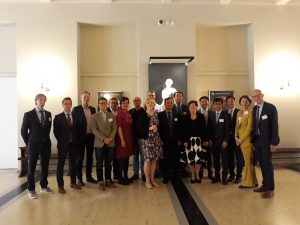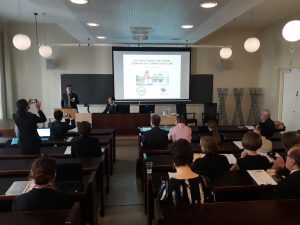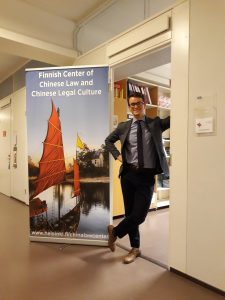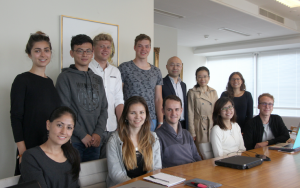
On 10-11 June 2019, the China Law Center together with the Chinese Academy of Social Sciences (CASS) and in collaboration with Faculty of Law at University of Helsinki, organized the 10th Sino-Finnish Bilateral Seminar on Comparative Law. The seminar is held annually and its location alternates between Finland and China. This year the seminar was hosted by University of Helsinki.
Sino-Finnish seminars form an important part of the bilateral cooperation with CASS and are meant to facilitate legal dialogue in different fields of law. This year the 10th seminar was delighted to have six academics from CASS which is the leading Chinese research and education institution in the field of social sciences in China. These scholars were Director of Institute of Law, Professor Chen Su, Professor Xie Zengyi, Professor Zhai Guoqiang, Associate Professor Zhao Lei, Assistant Professor Yue Xiaohua and Assistant Professor Wang Shuaiyi.
The seminar was opened by remarks from both Professor Pia Letto-Vanamo, the Dean and Chair of the Board of the Finnish China Law Center, and Professor Chen Su. Both highlighted the importance of the work of the Center, as well as the collaboration between Chinese and Nordic scholars on a widening array of topics.
The bilateral seminar being the 10th of its kind also marked a significant milestone in the bilateral relations between the China Law Center, CASS and the University of Helsinki. Having lasted for ten years now, the cooperation is on a more solid footing than ever before. The recent proof of the cooperation’s results is its recognition by the the Sino-Finnish joint action plan (Joint Action Plan between China and Finland on Promoting the Future-oriented New-type Cooperative Partnership)

Thematic areas of the seminar
The general theme of the 10th seminar was sustainability and different sessions covered this theme from the viewpoints of environment, business and labour as well as corporate governance. In addition to sustainability, the seminar also saw two sessions focusing on law, language and culture and public law.
The seminar’s first session covered law, language and legal culture beginning by a comparative analysis of culture and legal culture in China and the Nordic countries by Professor Ditlev Tamm. Professor Matti Nojonen’s presentation addressed the concept of ‘practical rationality’ analysed traditional and contemporary Chinese legal thinking. Assistant Professor Wang’s presentation was about the influence of Chinese traditional culture on law from the viewpoint of civil law and criminal law. Finally, Marinna Hintikka and her colleagues gave a presentation on workplace communication at Law Faculty reflecting methodology, motivation and practical application.
The second thematic area covered was sustainability and environment. This session saw two presentations: one from Professor Kai Kakko under the title “From environmental law to sustainability law – some general aspects and a case study about the forest definition” and the other from Assistant Professor Yue Xiaohua under the title “Regulation development and its system improvement of China’s natural resources”.
A third thematic area discussed sustainability and business and it saw presentations from University Researcher Harriet Lonka on the topic of food law as a tool for advancing sustainable business, from Associate Professor Zhao Lei on the role of credit in the era of big data in promoting business development, from Professor Veli-Matti Virolainen on sustainable business models and ecosystems and from Professor Ellen Eftestøl-Wilhelmsson on the topic of the proposed EU regulation on electronic freight transport information.
In the second day of the seminar, themes incorporating sustainability and labour as well as public law developments were discussed. The first session included a presentation from Professor Ulla Liukkunen on the topic of employee participation in corporate governance, from Professor Xie Zengyi on the topic of employee participation in corporate governance in terms of Chinese experience and from Professor Jukka Mähönen on the topic employee participation in corporate governance: a possibility for or a threat to sustainability.
The seminar’s final session covered developments in public law with presentations on the developments in evidence in criminal procedure by Professor Tuomas Hupli, the development of constitutional structure in People’s Republic of China (1949-2019) by Professor Zhai Guoqiang and, thirdly, on law and development in a global context by Professor Kimmo Nuotio.

Book publication
The seminar also celebrated a joint publication by CASS and University of Helsinki. The title of the book is “Legal Reform and the Development of Rule of Law: A Comparison of between China and Finland” and it features contributions from legal scholars in both China and Finland, gathering together papers of the 8th and 9th Sino-Finnish seminars. The book has been edited by Chen Su and Ulla Liukkunen.
Next year’s 11th bilateral seminar will be held in China.





